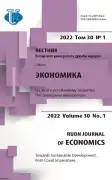The government policy of Zambia on attracting foreign direct investment and its effectiveness
- Authors: Andronova I.V.1, Haabazoka L.2, Kasonde A.M.1
-
Affiliations:
- Peoples’ Friendship University of Russia (RUDN University)
- University of Zambia
- Issue: Vol 30, No 1 (2022): TOWARDS SUSTAINABLE DEVELOPMENT. POST-COVID IMPERATIVES
- Pages: 33-44
- Section: WORLD CAPITAL MARKET
- URL: https://journal-vniispk.ru/2313-2329/article/view/324196
- DOI: https://doi.org/10.22363/2313-2329-2022-30-1-33-44
- ID: 324196
Cite item
Full Text
Abstract
Investment policy has always played one of the most important roles in the development of the national economy. Foreign direct investment is interconnected with the activities of multinational companies and the opportunities that can be obtained by the host country. The article reveals the investment policy of Zambia and the role played by the public sector in it. The identified competitive advantages prove that Zambia has significant investment potential even though the country does not have direct access to the sea. Significant reserves of mineral raw materials confirm the energy and resource security of the economy, which is the area for investment by both national and foreign companies. The authors pay attention to several important problems of socio-economic significance, which complicate the effective and full functioning of the economy. The authors found that there are not enough studies in the domestic and foreign literature on the investment potential of Zambia. The study of inward investment activity showed that free economic zones are the most effective tool for attracting FDI, while the extractive sector remains the most attractive in this area. A comparative analysis of the disadvantages and advantages of the Zambian economy, conducted by the authors, proves that the state has the necessary elements of investment attractiveness. However, it was noted that the arrival of investments in the country should also meet the socio-economic interests of the state.
About the authors
Inna V. Andronova
Peoples’ Friendship University of Russia (RUDN University)
Email: aiv1207@mail.ru
ORCID iD: 0000-0002-7861-5414
PhD in Economics, Professor, Head of the Department of International Economic Relations, Faculty of Economics
6 Miklukho-Maklaya St, Moscow, 117198, Russian FederationLubinda Haabazoka
University of Zambia
Author for correspondence.
Email: aiv1207@mail.ru
ORCID iD: 0000-0003-4055-2531
PhD, Director of the Graduate School of Business
Great East Road Campus, P.O. Box 32379, Lusaka, ZambiaAaron Mwewa Kasonde
Peoples’ Friendship University of Russia (RUDN University)
Email: 1032175656@pfur.ru
student of the program “International Economic Relations and international business” of the Faculty of Economics 6 Miklukho-Maklaya St, Moscow, 117198, Russian Federation
References
- Anglin, D.G., & Shaw, T.M. (2021). The Foreign Policy System of Zambia. Zambia’s Foreign Policy (p. 39).
- Bank of Zambia (2018). Foreign private investment and investor perceptions in Zambia (pp. 5-8). Retrieved August 15, 2021, from https://www.boz.zm/ForeignPrivateandInvestorPerceptionReport2018.pdf
- Denisova, T.S. (Ed.). (2013). Zambia: Reference and monographic publication. Monograph (p. 334). Moscow: Institute of Africa of the Russian Academy of Sciences.
- Dunhan, K.M. (1989). Vegetation-environment relations of a Middle Zambezi floodplain. Plant Ecology, 82(1), 13-24.
- Fanshawe, D.B. (1971). The vegetation of Zambia. Retrieved August 15, 2021, from https://www.biblio.com
- Fundanga, C.M., & Mwaba, A. Privatization of Public Enterprises in Zambia: An Evaluation of the Policies, Procedures and Experiences. African development bank economic research papers № 35. Retrieved August 15, 2021, from https://www.afdb.org/fileadmin/uploads/afdb/Documents/Publications/00157604-FR-ERP-35.PDF
- Knoema Data Platform (2021). Zambia Net FDI inflows, 1960-2021. Retrieved August 15, 2021, from https://knoema.com/atlas/Zambia/topics/Economy/Balance-of-Payments-Capital-and-financial-account/Net-FDI-inflows
- Lusaka South Multi-facility Zone Limited (2021). Annual Report 2020. Retrieved August 15, 2021, from https://lsmfez.co.zm/wp-content/uploads/2021/06/LS-MFEZ-Annual-Report-2020-2.pdf
- Pilossof, R., & Cohen, A. (2021). Zambia. Labour and Economic Change in Southern Africa c. 1900-2000 (p. 236).
- Prokopenko, L.Ya. (2018). The Principle ‘One Zambia, One Nation’: Fifty Years Later. Social Evolution & History, 17(1), 60-75.
- Prokopenko, L.Ya. (2019). Political stability and characteristics of national building in Zambia. Asia and Africa today, (9), 39-45. http://dx.doi.org/10.31857/S032150750006272-1
- Sanches, E. (2020). Zambia. Africa Yearbook Politics, Economy and Society South of the Sahara (p. 554).
- Santandertrade (2021). Foreign investment in Zambia. Retrieved August 15, 2021, from https://santandertrade.com/en/portal/establish-overseas/zambia/investing
- The World Bank (2020). Foreign direct investment, net inflows. Retrieved August 18, 2021, from https://data.worldbank.org/indicator/BX.KLT.DINV.CD.WD
- U4 Anti-corruption resource center (2020). Zambia overview of corruption and anti-corruption. Retrieved August 15, 2021, from https://www.u4.no/publications/zambia-overview-of-corruption-and-anti-corruption-2020.pdf
- World Bank Group (2020). Economy profile of Zambia. Doing business (p. 67). Retrieved August 15, 2021, from https://www.doingbusiness.org/content/dam/doingBusiness/country/z/zambia/ZMB.pdf
- World Bank Group (2020). Poverty and equity brief. Zambia (p. 2). Retrieved August 18, 2021, from https://databank.worldbank.org/data/download/poverty/987B9C90-CB9F-4D93-AE8C-750588BF00QA/SM2021/Global_POVEQ_ZMB.pdf
- Zambia Development Agency (2006). The Zambia Development Agency Bill. Retrieved August 15, 2021, from https://www.zda.org.zm/wp-content/uploads/2020/12/ZDA-Act-2006-1.pdf
- Zambia Development Agency (2020). Annual report 2019. Retrieved August 15, 2021, from http://ayokos.com/vs/zdanew/wp-content/uploads/2020/09/ZDA-2019-ANNUAL-REPORT.pdf
- Zambia-China Economic & Trade Cooperation Zone (ZCCZ) Ltd. Investment promotion. Retrieved August 15, 2021, from http://zccz.cnmc.com.cn/outlineentem.jsp?outlinetype=2&column_no=071302
Supplementary files









